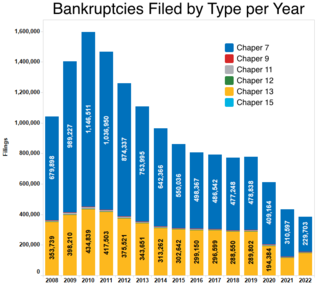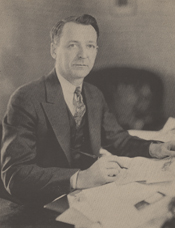Bankruptcy is a legal process through which people or other entities who cannot repay debts to creditors may seek relief from some or all of their debts. In most jurisdictions, bankruptcy is imposed by a court order, often initiated by the debtor.
Chapter 11 of the United States Bankruptcy Code permits reorganization under the bankruptcy laws of the United States. Such reorganization, known as Chapter 11 bankruptcy, is available to every business, whether organized as a corporation, partnership or sole proprietorship, and to individuals, although it is most prominently used by corporate entities. In contrast, Chapter 7 governs the process of a liquidation bankruptcy, though liquidation may also occur under Chapter 11; while Chapter 13 provides a reorganization process for the majority of private individuals.

The United States courts of appeals are the intermediate appellate courts of the United States federal judiciary. The courts of appeals are divided into 11 numbered circuits that cover geographic areas of the United States and hear appeals from the U.S. district courts within their borders, the District of Columbia Circuit, which covers only Washington, D.C., and the Federal Circuit, which hears appeals from federal courts across the United States in cases involving certain specialized areas of law. The courts of appeals also hear appeals from some administrative agency decisions and rulemaking, with by far the largest share of these cases heard by the D.C. Circuit. Appeals from decisions of the courts of appeals can be taken to the U.S. Supreme Court.
Debt restructuring is a process that allows a private or public company or a sovereign entity facing cash flow problems and financial distress to reduce and renegotiate its delinquent debts to improve or restore liquidity so that it can continue its operations.
An estate, in common law, is the net worth of a person at any point in time, alive or dead. It is the sum of a person's assets – legal rights, interests and entitlements to property of any kind – less all liabilities at that time. The issue is of special legal significance on a question of bankruptcy and death of the person.
The United States Trustee Program is a component of the United States Department of Justice that is responsible for overseeing the administration of bankruptcy cases and private trustees. The applicable federal law is found at 28 U.S.C. § 586 and 11 U.S.C. § 101, et seq.

In the United States, bankruptcy is largely governed by federal law, commonly referred to as the "Bankruptcy Code" ("Code"). The United States Constitution authorizes Congress to enact "uniform Laws on the subject of Bankruptcies throughout the United States". Congress has exercised this authority several times since 1801, including through adoption of the Bankruptcy Reform Act of 1978, as amended, codified in Title 11 of the United States Code and the Bankruptcy Abuse Prevention and Consumer Protection Act of 2005 (BAPCPA).

In accounting, insolvency is the state of being unable to pay the debts, by a person or company (debtor), at maturity; those in a state of insolvency are said to be insolvent. There are two forms: cash-flow insolvency and balance-sheet insolvency.
Thomas H. Jackson is an American legal scholar who was the ninth president of the University of Rochester, preceded by Dennis O'Brien. Jackson held the position of president from 1994 until he formally stepped down on June 30, 2005 and was succeeded by Joel Seligman. Jackson's tenure was marked by the controversial "Renaissance Plan", which cut undergraduate enrollment while making admission more selective, and cut several graduate programs. He holds the position of Distinguished University Professor and has faculty appointments in the department of political science and in the William E. Simon Graduate School of Business Administration at the University of Rochester. Jackson is known as one of the nation's foremost experts on bankruptcy law.
Bankruptcy in the United Kingdom is divided into separate local regimes for England and Wales, for Northern Ireland, and for Scotland. There is also a UK insolvency law which applies across the United Kingdom, since bankruptcy refers only to insolvency of individuals and partnerships. Other procedures, for example administration and liquidation, apply to insolvent companies. However, the term 'bankruptcy' is often used when referring to insolvent companies in the general media.
Northern Pipeline Construction Company v. Marathon Pipe Line Company, 458 U.S. 50 (1982), is a United States Supreme Court case in which the Court held that Article III jurisdiction could not be conferred on non-Article III courts.
The Enterprise Bankruptcy Law of the People's Republic of China was first passed in 1986. On 1 June 2007, the new Enterprise Bankruptcy Law of the PRC came into force. It contains 136 articles, almost 100 more than the 1986 law it replaced, and consequently it is thought to be more complete legally.

The Federal Circuit Court of Australia, formerly known as the Federal Magistrates Court of Australia or the Federal Magistrates Service, was an Australian court with jurisdiction over matters broadly relating to family law and child support, administrative law, admiralty law, bankruptcy, copyright, human rights, industrial law, migration, privacy and trade practices.

St. John's University School of Law is a Roman Catholic law school in Jamaica, Queens, New York, United States, affiliated with St. John's University.

James Mark Wilcox was a U.S. Representative from Florida. He is remembered as the author of the Wilcox Municipal Bankruptcy Act, which became law in 1934, a bill which initially allowed a city in his district, West Palm Beach, to adjust its bonded indebtedness and avoid bankruptcy. It was later invoked to help New York City avoid bankruptcy in 1972.

The Frazier–Lemke Farm Bankruptcy Act was an Act of Congress passed in the United States in 1934 that restricted the ability of banks to repossess farms.
Douglas Gordon Baird is an American legal scholar, the Harry A. Bigelow Distinguished Service Professor and a former dean of the University of Chicago Law School. He joined the faculty in 1980 and served as the dean from 1994-1999. He is a leader in the field of bankruptcy law.

The American Bankruptcy Institute Law Review is a biannual law journal published by St. John's University School of Law and the American Bankruptcy Institute (ABI). A free digital edition of the Law Review is distributed to all American Bankruptcy Institute members as part of their membership. A print edition is available for an additional charge.
The history of bankruptcy law in the United States refers primarily to a series of acts of Congress regarding the nature of bankruptcy. As the legal regime for bankruptcy in the United States developed, it moved from a system which viewed bankruptcy as a quasi-criminal act, to one focused on solving and repaying debts for people and businesses suffering heavy losses.
The history of bankruptcy law begins with the first legal remedies available for recovery of debts. Bankruptcy is the legal status of a legal person unable to repay debts.







